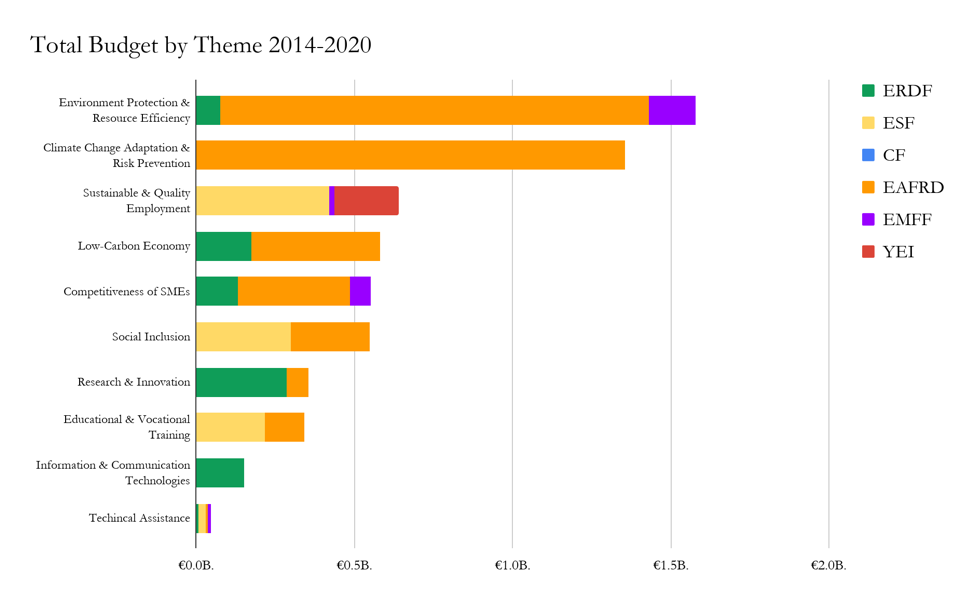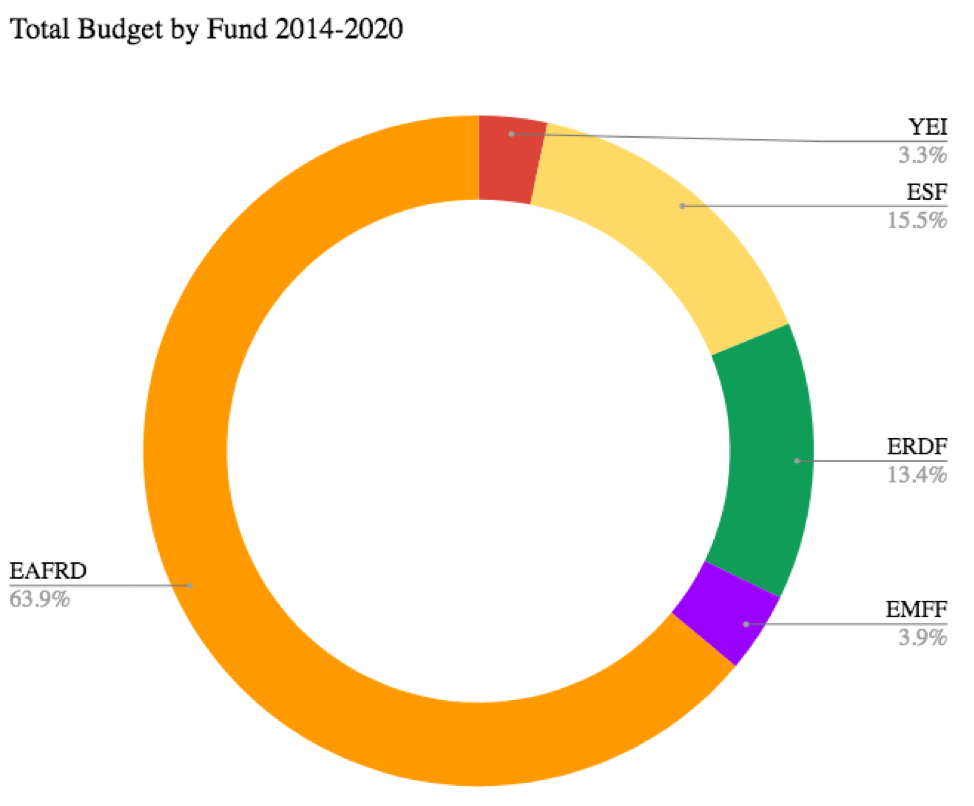News
Country Profile | Ireland

Through a total of five national programmes, Ireland has been allocated €3.36 billion from ESI funds for the duration of the 2014-2020 Multiannual Financial Framework; an additional national contribution of €2.77 billion take Ireland’s total budget to €6.13 billion. This budget is designed to support Ireland’s socio-economic development and is to be invested in:
- Promoting business investment in research and innovation (R&I);
- Developing links and synergies between businesses, research and development (R&D) centres and the higher education sector;
- Enhancing access to, use and quality of, information and communication technologies (ICT), investing in the extension of the next-generation broadband network to all unserved areas of the country;
- Supporting the capacity of SMEs in the agriculture, fisheries and aquaculture sectors to grow in regional, national and international markets;
- Facilitating the shift towards a low-carbon economy in all sectors;
- Promoting climate change adaptation, risk prevention and risk management;
- Contributing to preserving and protecting the environment, as well as promoting resource efficiency;
- Promoting social inclusion, combatting poverty, tackling discrimination and promoting equal opportunities
- Promoting access to employment, in particular to youth through the YEI;
- Fostering adult literacy and back-to-education initiatives for very low skilled people.
The main investment areas of the government of Ireland are strongly linked to climate change and environmental concerns, as improvements in the protection of the environment and resource efficiency are the top priority. Thanks to the European Agricultural Fund for Rural Development (EAFRD), the European Regional Development Fund (ERDF) and the European Maritime and Fisheries Fund (EMFF), more than €1.5 billion are being invested to help the country’s environmental protection programmes and enhance the resource efficiency.

In addition, the EAFRD will help Ireland reach its environment-related goals thanks to €1.3 billion coming from the EAFRD, to be used to moderate potential damages, to take advantage of opportunities, or to cope with consequences, coming from climate change. Moreover, shifting towards a low-carbon economy is a priority for the Irish government and, to take substantial measures to address this theme, the ERDF and EAFRD have assigned Ireland a total of almost €600 million. As shown in the chart above, in order to help Ireland create sustainable and quality jobs that meet economic, social and environmental conditions, the European Social Fund (ESF), the Youth Employment Initiative (YEI) and the EMFF are providing the country more than €600 million.
Chart 2 helps us fully understand the EU funding budget of the Irish government, thanks to an overview of the total available budget divided into the shares that each European Fund has in the total budget of €6.13 billion.

With 63.9% of the total budget, the European Agricultural Fund for Rural Development (EAFRD) is the largest contributor to European funding in Ireland, granting a budget of around €4 billion distributed in almost all the important themes of investments of the Irish agenda. The second largest contributor is the European Social Fund (ESF), that accounts for 15.5% and a total of €1 billion being invested in creating sustainable jobs, in promoting social inclusion and in upskilling workers with educational and vocational training. The European Regional Development Fund (ERDF) has a total share of 13.4% and is investing €800 million in matters related to environment protection and climate change. With 3.9% the European Maritime and Fisheries Fund is granting Ireland just above €200 million to be used in increasing the competitiveness of SMEs in the aquaculture business and the protection of the Irish coastal environment. With just 3.3% and €200 million invested, the Youth Employment Initiative is helping Ireland create sustainable and quality jobs.
In the matter of absorption rate, Ireland is among the top performing EU member states: with 48% of spent funding from the ESIF, the country has one of the highest percentages in the European Union, being 20% above the EU average of 28%. When it comes to allocated resources to selected projects, Ireland is the registered the best performance of all EU member states. With 94% of already assigned funding, Ireland is 29% above the 65% EU average, meaning that out of the €6.13 billion total budget around €5.75 billion have already been assigned. In fact, Ireland reached and surpassed the current EU average for assigned and spent funding in 2017, when the two data were respectively 67% and 30%.
Ireland remains among the most efficient EU member states at applying for, absorbing and using EU funds, and by the end of the current financial framework in 2020 is expected to allocate 100% and spend around 70% of the available financial resources.






